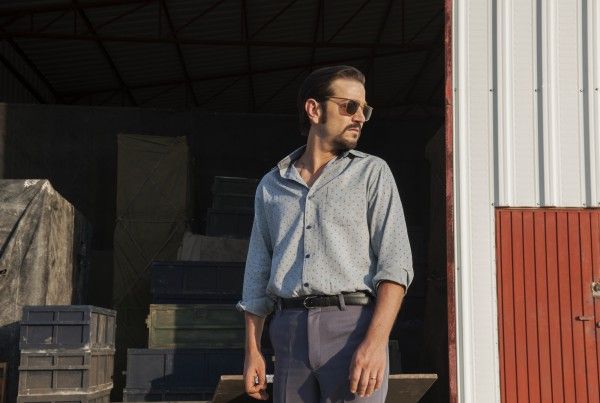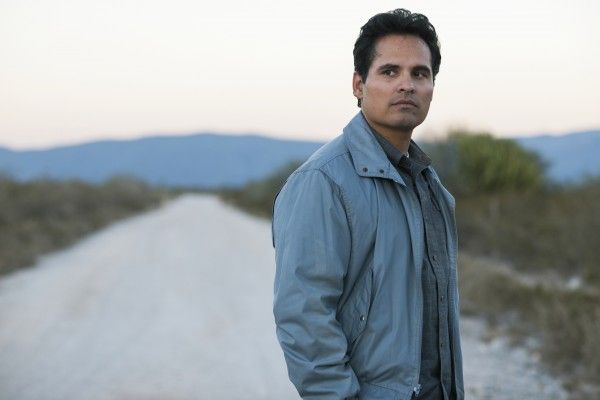“The narco who thinks he’s a businessman is a narco who is about to get fucked.” That piece of advice comes from Maria Elvira (Fernanda Urrejola) via her father, a small-time drug trafficker. Maria is now married to a big-time drug lord, Miguel Ángel Félix Gallardo (Diego Luna), who is looking to expand his hard-won Mexican marijuana empire into a transportation operation to move Colombian cocaine into the United States. The cocaine-focused part of the story will certainly be familiar to Narcos viewers, as the first three seasons of Carlo Bernard and Doug Miro’s Netflix series followed the rise of the Cali Cartel and Pablo Escobar, as well as the law enforcement officers who pursued them. Narcos: Mexico, helmed by showrunner Eric Newman, is a something of a prequel, as it chronicles the establishment of the first Mexican drug cartel as well as the fledgeling new U.S. government agency tasked with keeping tabs on it: the DEA.
Whether you’ve seen Narcos or not, it’s not hard to understand and be compelled by the world of Narcos: Mexico, which immediately introduces its opposing forces and sets the stage for their eventual clash. At this point (in the late 1970s and early 1980s), Mexico’s drug trade was chaotic and split up into tiny territories, most of which were constantly at war. When they weren’t, the government came in and burned fields as a show of strength for those who didn’t pay their dues and play their game. This is where Luna’s Félix (who at the time was just an underling to a territory boss) starts to see an opportunity to create an “OPEC of weed.” He’s shrewd and ambitious, and wants to turn drug making and drug running into a business; in other words, to organize.
His opponent is Kiki Camerena (Michael Peña), a DEA agent who moves his family to Guadalajara from California for a new job opportunity. Like Félix, Camerena is smart and focused, but finds the outpost in Guadalajara lacking in both drive and resources. His assertion that there is something big happening to change Mexico’s drug trade, coupled with his tenacity to prove it despite being thwarted by Mexican officials, lights a fire within his coworkers there. Soon, they have also organized — into a cartel-fighting task force.
At its best, Narcos: Mexico is reminiscent of HBO’s seminal series The Wire, exploring both the criminal enterprises and law enforcement sides equally, delving into its best and worst characters through compelling performances. There is a touch of Stringer Bell to Félix, who sees business as the only way to keep the manufacturing of drugs a stable operation, whereas Kiki is more of a sober McNulty. He’s never really off-duty, and soon becomes obsessed with finding a way to bring Félix and his growing business to justice.
What makes Narcos: Mexico work so well though is that there’s never a lag in Félix or Kiki’s stories — both are fascinating. There’s a limited use of voiceover to start each episode that rolls through a little history and exposition, which allows the character drama to flourish without having to find ways to explain the nuances of, say, the political background of that era. There’s still plenty of evidence of it, though, as both Félix and Kiki come up against bureaucracies that frustrate what they are trying to accomplish. It’s one of the almost ironic parallels between the two men’s stories, which both come down to issues of greed, power, ego, and respect. And yet, this isn’t just a gun-and-drug-fueled look at the early days of the War on Drugs’ gangland violence; it’s the study of two men who represent each side of it, two examples of the humanity often forgotten amidst the colossal largess of the overall issue.
Luna and Peña bring a lot of charisma to their roles, even though the characters are essentially stoics compared to the mad world around them. The supporting cast is also excellent, including some good Texas twang from Matt Letscher as Kiki’s boss, Joaquín Cosio as Félix’s grumpy partner, José María Yazpik as a pilot who will soon be running an empire of his own, and Tenoch Huerta as Félix’s brother Rafa, the creator of their potent strain of marijuana. There are also some returning characters from the original Narcos, as Félix moves into Colombia, but the heart of the story remains, of course, in Mexico.
With a tense, stirring score from Gustavo Santaolalla, Narcos: Mexico is a really series of meetings and standoffs, with outcomes that have real stakes. There’s an investment and connection to both Félix and Kiki’s operations, and a savviness the show has in fostering empathy for both characters equally, which is a tricky line to toe. But it does so by keeping things as grounded as possible. The series doesn’t glorify the drug lord lifestyle so much as paint it as an ephemeral, cautionary tale; Maria’s words to Félix are a foreshadowing of the eventual demise of the kingdom he has built. And the U.S. agents aren’t suave and armed with resources; they’re understaffed, frustrated, and unsure. Right now, Narcos: Mexico is interested in the process of building things up, be it a drug empire or an agency task force, and it’s a fascinating one (at least through the first 5 episodes Netflix gave to critics).
There are many admirable qualities to the series’ production, the foremost being that (like its predecessor), the show is truly bilingual. Less successful is its lack of female characters who go beyond typical wife or mother tropes; they’re strong supporters of their husbands, or they’re wise confidants, but they never get stories of their own. (That’s particularly unfortunate for a character like Maria, whose family history of trafficking — whereas Félix was originally a cop — seems like a fascinating thread to follow). But ultimately, though the episodes are lengthy (each lasting at least a full hour), the pacing is taught; historically we may know the outcome, but there is enough charm and uncertainty to the way Narcos: Mexico crafts its story to keep things consistently interesting and compelling. We’re reminded at the start of this season that the War on Drugs is a story without an end. But for the players within it, as Maria warns, there will come a point where you won’t be able to out-think or outmaneuver. Eventually, you will fall.
Rating: ★★★★
Narcos: Mexico premieres Friday, November 16th on Netflix.






